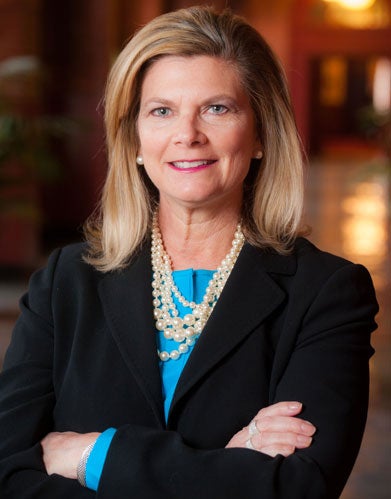Title: Georgetown CIO: High-Tech Innovation Key to Higher Ed Adaption
Georgetown Vice President and Chief Information Officer Lisa Davis says the university is committed to creating a culture of innovation as higher education evolve and adapts with technology.

“What I’m most proud of in the last 18 months is creating a culture of innovation enabled by technology and having universityleadership understand how critical technology is today to be competitive and to remain competitive in the top 20 because our students demand it, our faculty and our staff demand it,” said Lisa Davis, Georgetown’s chief information officer.
Nurturing innovation while modernizing foundational technology infrastructure will help Georgetown thrive in the ever-changing and competitive world of higher education, according to Georgetown’s vice president and chief information officer.
Since Lisa Davis arrived at Georgetown in early 2012 to lead University Information Services (UIS), she has focused on changing how technology is viewed at the university and strived to create a “digital campus for the future.”
She says the university is in a period of experimentation as it leverages technology to enhance teaching, learning and research at Georgetown
“Everything we do in technology serves the faculty, the students, the staff and the alumni of this institution,” she said “What we’re driven [by] is … how can we leverage technology to make you a more productive faculty member, a more successful student, a more productive staff member. That is really the vision and the mantra of how we operate day to day.”
Georgetown so far has successfully experimented with online classrooms and software, including MOOCs, through its partnership with edX.
“What I’m most proud of in the last 18 months is creating a culture of innovation enabled by technology,” she said, “and having universityleadership understand how critical technology is today to be competitive and to remain competitive in the top 20 because our students demand it, our faculty and our staff demand it.”
Once and Future Projects
Under Davis’ tenure, technology upgrades include establishing ubiquitous wi-fi across campus, moving Georgetown onto Google apps, creating a campus-wide collaboration platform and the launch of the GUmobile, Georgetown’s mobile app platform with features including the NextGUTS bus GPS tracking and Emergensee, a safety feature.
Davis was particularly excited about bringing the open source mobile app platform to Georgetown.
“We chose an open source platform to create a space for students, faculty and staff to build new apps,” she said. “My hope is that future updates of GUmobile will include features developed for the Georgetown University community by Georgetown developers.”
Future projects include upgrading GU’s print system to enable mobile print, the launch of a business intelligence and analytics platform, and the conversion of the university’s web content system to Drupal.
Enabling Success
Students have played a significant role in UIS-sponsored events, including last year’s Hackathon, where several students developed an app called “Classy” that was incubated at GU, developed and eventually implemented as a service to help students pre-register for courses.
This year, UIS co-hosted a storytelling summit set for Nov. 16 at the School of Continuing Studies’ new downtown location.
The student led event, which included thought-leaders from the tech, media, design and communication sectors, was designed to help students, faculty, staff and alumni to improve their storytelling skills.
UIS and the other event co-hosts hope that engaging Georgetown in imagining the possible will be the inspiration for innovation at GU’s 2014 Hackathon.
Event hosts included UIS and the Office of the Chief Information Officer, the Office of the President, the Office of the Provost, the Office of the Chief Operating Officer, the Office of Planning and Facilities Management and the Office of Sustainability.
Student Inspiration
“The perfect example we give of what we hoped to see the Storytelling Summit inspire is Google Glass,” Davis said about the storytelling summit. “The story… or the fiction of what might be possible with a wearable computer drove the outcome of the design of that product.”
Davis credited students and her student tech advisory board for taking a lead role in navigating Georgetown’s path of innovation.
“Frankly, when I’m having a bad day, that’s the group that inspires me because they have so much energy and they’re so passionate about what we’re doing,” Davis said. “They are the ones who have been driving this whole cadence on innovation.”